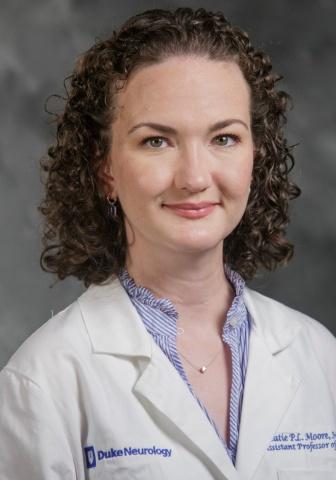
Kathryn Moore’s interest in neurology goes back to at least the 6th grade, when she used an apple slice to explain the basics of brain anatomy to her friends. She majored in neuroscience at Duke University before attending UNC Chapel Hill for her medical degree and neurology residency. Now, she’s back at Duke as our newest movement disorders specialist. In this week’s “Spotlight” interview, Moore talks to us about the joys of treating patients with movement disorders, shares experiences from her time at both institutions, and enjoying needlework, travel, and the theater when she’s not at Duke.
What are your current responsibilities within the Neurology Department? What does a typical day look like for you?
I am a movement disorder neurologist. I see patients at the Morreene Road clinic. I also perform botulinum toxin injections and deep brain stimulation programming. When I’m not seeing patients, I am conducting clinical trials and researching improved access to subspecialty neurological care in advanced movement disorder patients for whom it is difficult or impossible to come to clinic.
How and when did you first get interested in neurology?
My first clear memory of being excited by neurology was in the 6th grade. I clearly recall explaining the basic structures of the brain to my school friends using an apple slice. How I even knew the general difference between the cerebrum, ventricles, and brainstem at that time I can’t recall, but it was already clear that I was quite the geek. I’ve been fascinated with the nervous system ever since. I actually got my undergraduate degree in neuroscience here at Duke and had many wonderful classroom, research, and clinical experiences that fine-tuned that enthusiasm towards a career in neurology.
What interests or inspires you about movement disorders in particular?
Movement disorders really is a special field. We get to help our patients and their care partners over many years as they live with highly complex disorders. I also find lots of satisfaction in utilizing the neurologic exam as our primary diagnostic tool. Patients often express surprise that we can frequently arrive at a diagnosis without performing any laboratory or imaging tests.
You completed your undergraduate degree at Duke, followed by your medical degree and neurology residency at UNC-Chapel Hill. What's one memory or experience from each of those locations that stands out to you?
As I mentioned, I had a remarkable time here at Duke. While conducting translational bench research in glioblastomas with Dr. Jeremy Rich, I had the opportunity to join the CAPE program and start to see brain tumor patients in the clinic with Dr. Henry Friedman and his colleagues. To be 19 years old and catch a glimpse of the clinician-scientist life was very inspiring.
I also had wonderful mentors in movement disorders as well as geriatrics at UNC. I really fell in love with the subspecialty of movement disorders working with Dr. Browner and her colleagues. My experience with house calls as a medical student has motivated my research endeavors and passion for improving access to care in people with advanced movement disorders.
What’s one thing you wished more people knew about movement disorders?
I’ll do two things if that’s ok. One is that while very few movement disorders have cures, there are many things we can do to help our patients. And that list is growing! Like many of our colleagues in neurology, we’re definitely not following the old “diagnose and adios” myth. The other is that once you train as a movement disorder neurologist you will start to see these diseases all around you. Because much of our diagnosis is made by observing patterns of abnormal movements, you’ll find yourself, for example, at the mall noticing all the parkinsonism around you.
What other passions or hobbies do you have outside of the Department?
I’m interested in education and mentorship at all levels. As part of that, I’m working towards a masters degree in health professions education at Johns Hopkins in the evenings/weekends. I really enjoy traveling and trying new foods. My husband and I like a wide variety of things including going to sporting events, the ballet, and the theater. Like many people, I’ve been nurturing other hobbies during the pandemic and have taken up needlework.